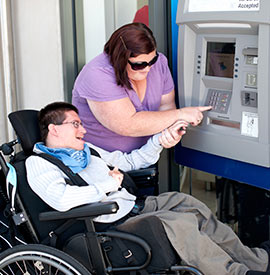1970s
Dungarvin is a national organization of privately owned companies that was founded by Tim and Diane Madden. When the Maddens were in college, they had worked with people with developmental disabilities as volunteers in a summer camp, and as employees in a large IDD facility. Tim and Diane opened the first Dungarvin program, an IDD facility serving 15 people, in St. Paul, Minnesota, in March 1976. Tim and Diane were the live-in “houseparents” for that first program.
As the movement toward community integration took hold in Minnesota, Tim and Diane developed five more small IDD programs in the Minneapolis-St. Paul metropolitan area. During these early years, Dungarvin developed a culture of quality services, responsiveness, and innovation, upon which the entire organization has been built.
1980s
In 1981, Dungarvin found an opportunity to grow rapidly, by purchasing a 100-person IDD facility in St. Paul, which was promptly renamed Wicklough. Dungarvin’s management team immediately began planning to downsize the Wicklough facility, in order to better integrate the residents of Wicklough into the community. By 1988, the Wicklough facility was closed, and its residents had moved into dozens of supported living programs.
In addition to Wicklough, between 1984 and 1988, Dungarvin assumed management responsibility for two other large IDD facilities that were facing financial and programmatic difficulties. Dungarvin’s management team successfully downsized those facilities, transitioning another 100 adults with developmental disabilities into community-based supported living programs.
By 1988, the Dungarvin management team was looking for new challenges. At the same time, the State of Indiana was seeking private providers to develop community-based programs for people who had been living in state-run institutions. Dungarvin submitted a proposal to the State of Indiana and was selected as a provider. Over the next three years, Dungarvin Indiana would open 17 small ICF/MR programs across northern Indiana.
1990s
The early and mid-1990’s were times of rapid growth and change for Dungarvin. Responding to invitations from several state and county agencies, Dungarvin initiated services in Colorado in 1991, Ohio in 1992, and Delaware in 1993. Those services, along with nearly all of the services developed by Dungarvin since then, were funded through the Medicaid Home and Community-Based Services Waiver program.
In 1994, Dungarvin again found an opportunity to grow by assuming responsibility for services that were developed by others, but had fallen into programmatic or financial distress. Dungarvin assumed responsibility for the operations of Center for Behavioral Services in New Mexico, and New Concepts in Wisconsin. At about the same time, Dungarvin was invited to serve a group of individuals in Illinois, who had lost their previous providers and were at risk of returning to State run institutions. Dungarvin rapidly deployed its full organizational resources to rapidly develop the supports that enabled those persons to successfully remain in the community.
Following the growth in 1994, Dungarvin found itself serving people in eight states, spread widely across the nation. It was necessary to make many changes in our management structure, in order to operate as a “national” provider. A regional management structure was put into place. Corporate teams were developed to support regional management in the areas of finance and accounting, human resources, and information systems.
In 1997, Dungarvin experienced another round of rapid growth, as services were initiated in Oklahoma, Tennessee, and California. Unfortunately, the expected opportunity to develop a strong base of services in Tennessee did not materialize, and Dungarvin made the difficult decision to end services in that state in early 1999.
During 1998 and 1999, Dungarvin grew at both ends of the nation – beginning services in both Oregon and New Jersey.
2000s
In early 2002, Dungarvin again faced the difficult decision to terminate services, this time in Illinois. Because of a major change in the payment structure for services, Dungarvin found it could no longer provide quality services in Illinois, in a fiscally responsible manner. Dungarvin ended its services in Illinois in April, 2002.
At the same time Dungarvin withdrew services in Illinois, a relationship was developing with the State of Alabama. Dungarvin responded to a Request for Proposal, and was selected as a service provider, initiating residential services in November 2002, followed by community-based day services in January 2003.
Over the past several years, Dungarvin has expanded services in other areas such as Traumatic Brain Injury, Fiscal Intermediary supports, and Host Home programs. During this time, Dungarvin grew in both the Western and the Eastern United States. During 2006, Dungarvin initiated services in Utah. Additionally in 2006, at the request of contracting officials in New Mexico and Nevada, Dungarvin expanded by assuming the residential and day services of other providers. In early 2007, Dungarvin made the difficult decision to terminate services in Delaware. At about the same time Dungarvin became a provider for residential services in the State of Washington. During 2008 Dungarvin established Host Home programs in the District of Columbia and initiated supported living services in Connecticut in early 2009. In early 2009, Dungarvin made the difficult decision to suspend services in both the State of Washington and the District of Columbia.
Today, Dungarvin provides services to over 5,000 individuals with intellectual and developmental disabilities in more than 1,100 locations across 15 states. Unique among large providers, Dungarvin has chosen not to operate large facilities; our primary emphasis is on person-centered supports through Medicaid Home and Community-Based Waiver programs. In addition to residential supports, Dungarvin provides day services, supported employment, supported foster care, Host Homes, case management services, children’s services, respite care, supports for traumatic brain injury and transitional services.


